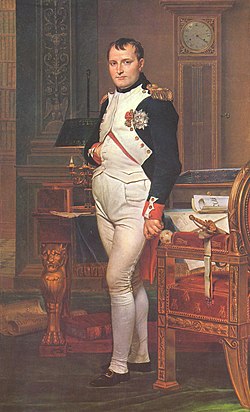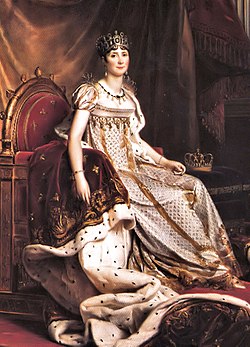 I've always been intrigued by the private self that is revealed by famous people in their letters, particularly those that pass between lovers, and even more tellingly, between spouses. It's become a revelation to me as I research my work-in-progress on notorious royal marriages; the most obnoxious, autocratic, boorish people can become tender and gooey as S'mores when their ink is flowing as rapidly (or lustfully) as their blood.
I've always been intrigued by the private self that is revealed by famous people in their letters, particularly those that pass between lovers, and even more tellingly, between spouses. It's become a revelation to me as I research my work-in-progress on notorious royal marriages; the most obnoxious, autocratic, boorish people can become tender and gooey as S'mores when their ink is flowing as rapidly (or lustfully) as their blood.In 1795, a rising Corsican military man, Napoleon Bonaparte, had become commander of the Army of the Interior and then, through the assistance of his friend Paul Barras, secured a post within an influential department of the Committee for Public Safety in Paris. Napoleon decided that in his quest for status, wealth and power, it was time to find a rich wife. “It is not necessary that our wives should be good looking,” he asserted. Of course, “with a mistress it is different” as an ugly paramour would have failed in her only duty.
He’d had his eye on Barras’s lover and salon hostess, Rose de Beauharnais. Rose’s rapt attention to Napoleon's war stories at dinner one evening cemented Napoleon Bonaparte’s desire for her. He yearned for recognition and her praise had stroked his ego into a lustful frenzy. They became lovers—if not that night, then not too much later. For Rose, the affair was a pleasant diversion, but Napoleon was smitten.

After their first night between the sheets Rose gave him a sketch of herself as a memento. Only hours after leaving her bed, he scribbled a note headed “seven in the morning” and filled with rhapsody.
I awaken full of you. Between your portrait and the memory of our intoxicating night, my senses have no respite. Sweet and incomparable Josephine [by now he had renamed her], what is this strange effect you have upon my heart? What if you were to be angry? What if I were to see you sad or troubled? Then my soul would be shattered by distress. Then your lover would find no peace, no rest. But I find none, either, when I succumb to the profound emotion that overwhelms me, when I draw from your lips, from your heart, a flame that consumes me. Ah, it was last night that I realized that your portrait is not you and that . . .
You will be leaving the city at noon. But I shall see you in three hours. Until then, mio dolce amor, I send you a thousand kisses—but send me none in return, for they set my blood on fire.
But the poet had a pragmatist’s soul. Before pursuing a serious involvement with Josephine, Napoleon visited her notary to inquire about her wealth.
Although Napoleon could not seem to remain sexually faithful to Josephine, she was his acknowledged soulmate. Josephine had enjoyed a passionate affair of her own early on in their marriage, so Napoleon spent the rest of it exacting his revenge by sleeping with just about everything in a petticoat. Nonetheless, when he was off campaigning, he wrote passionate, graphically bawdy letters that never sugarcoated his desire. In fact, one of the words he used to describe a certain part of his wife's anatomy is unprintable in this milieu.
He longed to kiss her heart, then her lower anatomy, then much lower (he emphatically double-underscored the word), referring to her as his “sweet love . . . the pleasure and torment” of his life. “Never had a woman been loved with more devotion, fire, and tenderness.” If she ever left him he’d have lost everything that made life worthwhile. He dreaded losing her and her “adorable person.”
On April 3, 1796, Napoleon wrote: You are the one thought of my life. When I am worried by the pressure of affairs, when I am anxious as to the outcome, when men disgust me, when I am ready to curse life, then I put my hand on my heart, for it beats against your portrait. . . .” Is that why he’s always painted with his right hand shoved under his left lapel?
By what magic have you captivated all my faculties, concentrated in yourself all my conscious existence? It constitutes a kind of death, my sweet, since there is no survival for me except in you.
To live through Josephine—that is the story of my life.
That last sentence can leave one breathless.
In the wake of his decisive victories against the Austrians that winter, his correspondence expressed his eagerness to show her the proof of his “ardent love”; to be in bed with her and once again see her face, and her hair bound into a headscarf à la Creole, and her “little black forest.”
I kiss it a thousand times and wait impatiently for the time when I will be in it. To live within Josephine is to live in the Elysian Fields.
Alexandra of Hesse, known to her family (including her grandmother "Gangan" Queen Victoria) as "Alicky," had fallen in love with Nicholas Romanov, the Russian tsarevich, as early as 1884 when as a little girl she developed a puppy-love crush on the handsome "Nicky." Yet even though she turned down other offers and her family was afraid she'd end up a spinster, Alicky was reluctant to marry Nicky because she would have to convert from Lutheranism to Russian Orthodoxy. However, her older sister Ella (Elizabeth) had married Nicky's uncle Serge and convinced Alicky that her religious qualms should not be an obstacle to her heart's desire. Once she got past that hurdle and gave her heart fully to Nicky (one of the few true love stories among royal marriages--each of them held out for the other), she had no problem pouring out her emotions on paper. During their brief engagement, Alicky discovered that Nicky kept a diary; so she would add her own little notes, in English, beneath his entries.

Nicholas and Alexandra: official engagement photograph, 1894.
Many loving kisses, she would invariably begin. Below is a sample of one of Alicy's early entries:
I dreamed that I was loved, I woke and found it true and thanked God on my knees for it. True Love is the gift which God has given, daily, stronger, deeper, fuller, purer.
And on their wedding night, Alicky wrote in Nicky's diary: At last, united, bound for life, and when this life is ended, we meet again in the other world and remain together for eternity. Yours, yours.

It proved eerily prophetic.
The following morning she wrote in his diary: Never did I believe there could be such utter happiness in this world, such a feeling of unity between two mortal beings. I love you, those three words have my life in them.
Her last sentence also takes my breath away.

I know that Tracy has used love letters in her novels to tremendously compelling effect. Tracy, how did the love letters shape your characters and what was it like to incorporate letters from actual historical personages; how did they feed and/or effect your story? To everyone else, have you used love letters within your stories, or read love letters between real-life lovers and/or spouses to inform your research for your own books? What do you think love letters say about character that can't be shown in other ways?
No comments:
Post a Comment